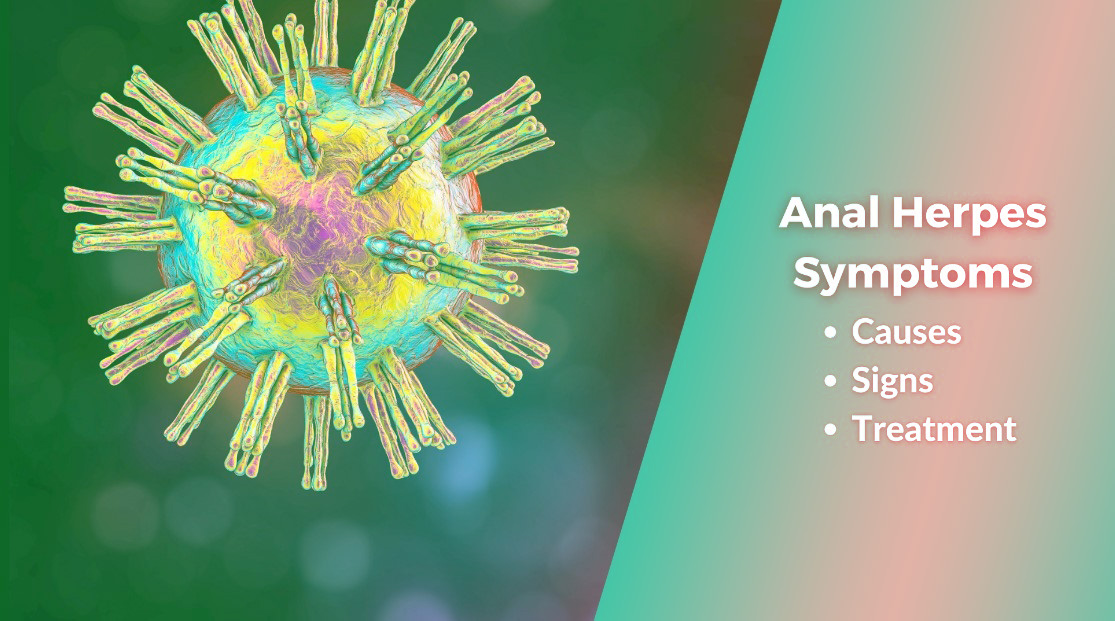Herpes is a group of infections that cause diseases in people.
Anal herpes is a disease brought about by the herpes infection that ejects as injuries or rankles around the rear-end, the opening through which solid discharges pass. Anal herpes is caused by the herpes simplex virus (HSV) – specifically, strains of HSV called HSV1 and HSV2.
Syphilis, chancroid, and donovanosis are infections that can cause various types of injuries around the butt.
These circumstances, including those brought about by HSV, obtain through sexual contact.

Table of Contents
Side Effects of Anal Herpes
Many individuals do not experience side effects right away, and the contamination can remain undetected for a long time. Regardless of whether individuals have no side effects, they can transmit the disease to other people.
Normal side effects of anal herpes include:
Analysis
The side effects of anal herpes are similar to those of a few different circumstances, including hemorrhoids and syphilis. A specialist might have the option to recognize the condition by sight or actual assessment.
Specialists might prescribe a blood test to search for the herpes infection.
If not, they might take a swab of the impacted region and then use the sample to run a DNA test called nucleic corrosive enhancement testing, or NAAT. These more up-to-date tests are accurate and quick and can determine whether an individual has an HSV-1 or HSV-2 infection. Persistent pain or tingling around the rear end.
Red knocks or dreary, excruciating rangles.
Rankles, bruises, or ulcers around the butt
Change in gut propensities
How is Anal Herpes Transmitted?
Anal HSV is a physically transmitted infection (STI). It passes from one individual to another through sexual contact or intercourse.
As per the Centers for Disease Control and Prevention (CDC), over 24 million Americans had HSV2 in 2013, and 776,000 extra Americans were being analyzed every year.
In the United States, 1 of every 6 individuals has genital herpes, as per the CDC. The very infection that causes genital herpes can cause injuries in the privates, butt, or perianus. In any case, not every person with genital herpes has anal herpes.
Treatment of Anal Herpes
Therapy for anal herpes decreases the length of the episode and the force. It might also decrease your chances of passing the condition to a sexual accomplice.
The fundamental treatment for anal herpes is virus-fighting treatment. HSV is an infection. Antiviral meds battle the infection. Individuals with HSV give antiviral meds to decrease the side effects until the episode ends. In addition, a specialist might recommend the regular use of antibiotics.
The long-term administration of antiviral drugs is called suppressive treatment. Individuals who undergo suppressive treatment to control HSV lessen their risk of passing HSV to a sexual accomplice.
In instances of serious anal herpes, your primary care physician might recommend intravenous antiviral treatment. This implies the antiviral prescriptions will infuse immediately into your circulatory system through a needle embedded into a vein.
Prevention of Anal Herpes
Individuals with genital HSV disease advise for refraining from sexual activity while experiencing side effects.
It is at this point that the infection becomes more infectious, yet it can still be given without causing any negative side effects.
You can lessen the risk of contracting HSV-2 by:
Continuously utilizing obstruction contraception during sexual activity (vaginal, anal, or oral sex) like condoms
Getting regular sexual health screenings for STIs
Assure that all your sexual accomplices also pass through routine sexual wellbeing screening or practice monogamy if you are seeing someone.
Swearing off sex out and out
Risk Factors
Assuming you have HSV-2, you may be more vulnerable to HIV.
This is because herpes disease can cause open wounds or breaks in the skin or coating of the mouth, vagina, and rectum. This makes it easier for HIV to enter the body.
It still increases the number of cells in the covering of the private parts that are insusceptible to HIV and thus more likely to get into the circulation system.
Assuming that you test positive for HSV-2, you should also get HIV testing.
Additionally, if you test positive for both HSV-2 and HIV, you run a significant risk of passing this on to a sexual partner.
Is Anal Herpes Infectious?
Anal herpes is infectious. The disease is likely to transmit to someone else when sores are visible on the skin in or around the breast.
When you have sexual contact with an infection, you can get the infection. Also, you can pass the infection to a sexual partner even when the infection isn’t causing clear side effects.
It is possible that you don’t realize you have HSV. Side effects aren’t generally self-evident, so you probably won’t realize you have the condition. All things considered, you might pass the infection to others without knowing.
FAQs
Anal herpes is a physical infection caused by the herpes simplex virus (HSV). Sexual contact is the primary way in which the infection spreads.
An estimated 50 million individuals in the United States contaminate with HSV-2, and the vast majority of these HSV-2 diseases are asymptomatic or unnoticed.
Acyclovir effective (for the skin) is an antiviral medication that prescribes to alleviate skin side effects brought about by the herpes infection. This cream uses to treat mouth blisters on the lips and face. Acyclovir skin balm uses to treat genital herpes injuries.
No, You Can’t Be Immune to Herpes
Herpes is profoundly infectious and everyone is susceptible to the disease. It considers quite normal, contaminating anywhere from over half of individuals (on account of HSV-1) to around 11% of individuals (on account of HSV-2).
Conclusion
Anal herpes is a type of genital herpes. It is more normal today than it was a few decades prior.
While specialists can’t eradicate the infection, there are presently numerous antiviral prescriptions that minimize side effects and abate the risk of transmitting it to other people.
Mindfulness is critical to lessening the spread of anal herpes, as is performing sex with condoms and following guidelines for individual cleanliness.
